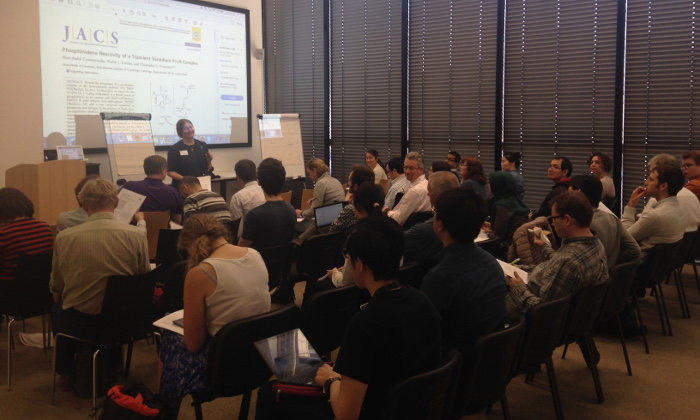Science and Engineering Research outputs workshop
07 Jun 2018
Helping researchers create world-leading papers in the Faculty of Science and Engineering

On Wednesday 23 May, the Faculty of Science and Engineering held its first Research Outputs Workshop. The all-day event invited research colleagues from across the Faculty to the Manchester Institute of Biotechnology for a full line-up of high profile guest speakers and interactive workshops.
The event was created to support the production of high quality research papers across the Faculty by reviewing the Research Excellence Framework processes and the output qualities of research papers. Beginning with an introduction from Professor Colette Fagan, Vice-President for Research, attendees were welcomed and introduced to the aims of the workshop and the expected outcomes from the event.
Professor Steve Williamson was the first guest speaker of the day. Professor Williamson discussed output quality for REF, from his experience as REF2014 Chair of sub-panel 13: Electrical and Electronic Engineering, Metallurgy and Materials.
Throughout the day a number of break-out sessions provided the opportunity for attendees to work collaboratively on the pre-publication processes in creating world-leading papers. The sessions were split into two groups, one focusing on science papers and the other on engineering. Attendees were given the opportunity to grade research papers according to the REF guidelines and discussed factors that improve output quality.
In the afternoon Professor Andrew Harrison provided attendees with his insight into what makes a world leading paper. Professor Harrison is CEO of Diamond Light Source and lectures here at the University. Having sat on the REF panel as a Chemistry sub-panel member, Professor Harrison contextualised the REF criteria, giving the audience critical insight into the REF processes and results from 2014.
The final session of the day was focussed on post-publication tactics, including the use of social media to improve visibility and experiences of working with press offices for promotion of research outputs.
The event ended with a drinks reception and networking opportunity. Of those who attended, one person reported that the workshop was “one of the most helpful sessions (they) had ever been to” and the talks in particular were “fantastic help and very useful”.
If you are interested in accessing the resources from the output workshops you can do so here.
